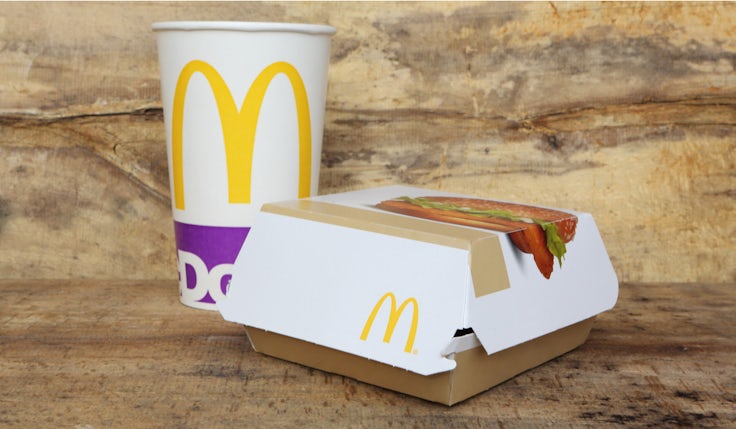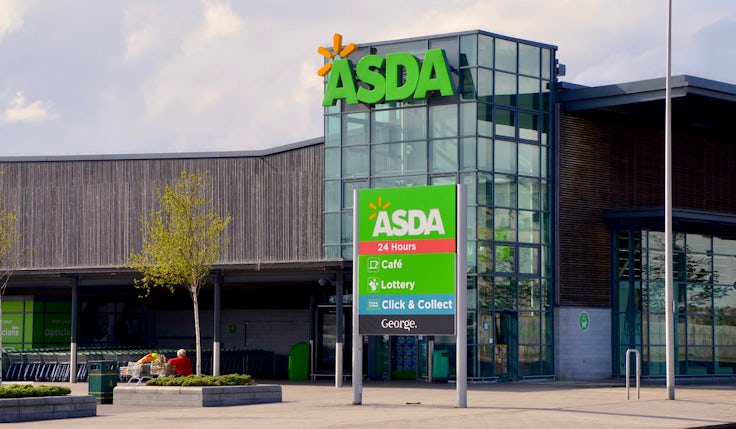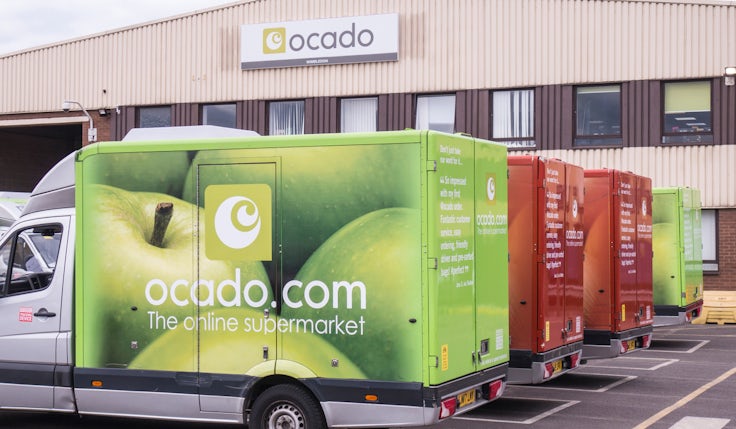Asda, Nestlé, Ocado: Everything that matters this morning
Good morning and welcome to Marketing Week’s round-up of the news that matters in the marketing world today.
Asda chief executive to step down
Asda CEO and president Roger Burnley will step down next year following the £6.8bn takeover of the supermarket.
The process to search for Burnley’s replacement will begin soon. He has been at the helm since January 2018, having joined the brand in 2016 as deputy CEO.
Walmart sold Asda in October to private equity firm TDR Capital, and Mohsin and Zuber Issa, founders and co-CEOs of the global convenience and forecourts retailer EG Group.
Burnley says: “My decision to leave Asda is personal and something I wanted to communicate to my colleagues as soon as I could. While I remain fully committed to leading this great business for the next year and delivering our strategy, it is right to plan for a managed succession process well in advance.
“It has been a great privilege to play a leading role at Asda over the last five years – putting in place a clear strategy for long-term sustainable growth and doing the right things for our customers, colleagues and the communities we serve.
Eve Sleep reveals strong growth and positive marketing reception
Eve Sleep has posted healthy growth in its full-year results and stated plans to continue brand building to maintain profitable growth.
Revenues for 2020 ending 31 December saw a 6% increase from £23.9m to £25.2m, while gross profit jumped 14% from £12.7 to £14.5. Group marketing efficiency improved by 2,634 bps to 24.2%
UK brand awareness grew 200bs to 17% in August and “remained strong since” with the company building on its brand with a TV campaign in November.
The company supported the ‘Wake up dancing’ campaign with the ‘Switch off with Eve Sleep’ campaign designed to build long-term brand presence and position it as a sleep wellness brand.
It runs every Sunday night across Channel 4 broadcast channels, digital and mobile advertising until spring this year. Analytics for the campaign have been “positive” and returns from the recent campaign “above projected expectations”.
Building a strong brand and customer experience is “at the centre of the Eve model” and is “essential to attaining profitability”.
Eve says the long-term investment into marketing is “a sign of increasing confidence in the business.”
Eve Sleep CEO Cheryl Calverley says: “Eve’s rebuild strategy is essentially complete, six months ahead of plan. We move now to accelerate our business, with a mind to leveraging our strong brand, efficient marketing, high performing products and excellent customer service to allow us to diversify across markets, channels and categories.
Ocado sales up 40%
Online grocer Ocado saw a 40% jump in sales benefiting from the “dramatic and permanent shift” towards consumers spending more online over the last year, and pledges to boost capacity.
A quarter of shopping baskets had M&S products in the last three months. Ocado began offering M&S products in September after ending its long-term association with Waitrose.
The company expects order quantity to return to normal levels when lockdown measures ease but it will have the capacity to fulfil large shopping orders.
Ocado says it will boost capacity by 40% by opening a second mini-warehouse capable of fulfilling 30,000 orders using robots in Bicester complementing the first in Bristol, two normal-sized warehouses will be set up in Andover.
Slow positive sales are expected in the next three months given the rise in sales during the first lockdown 12 months ago.
Average order cost grew from £110 a year ago to £147, this was spurred by shoppers spending more on home grocery deliveries over the festive period, as the government reversed its decision to relax lockdown measures.
Revenues for the brand grew 39.7% to £599m in the 13 weeks to 28 February, with average orders per week rising 2.5% to 329,000.
Ocado CEO Tim Steiner says: “We don’t expect that we’ll go back to the way things were pre-Covid. Large numbers of customers have tried online grocery for the first time and for the most part they see its benefits and won’t be going back.”
READ MORE: Ocado reports 40% increase in sales as orders surge in lockdown
Nestlé is first UK advertiser to use recycled paper in OOH advertising
Nestlé UK and Ireland has pledged it will use 100% recycled paper for its six sheet out-of-home advertising campaigns in 2021.
Campaigns for Polo, KitKat, Quality Street and Nescafé will use green printing techniques on 100% recycled paper in the coming months.
Nestlé says it took months of research and development for the firm to offer recycled printing techniques without loss of quality.
Nestlé UK and Ireland group marketing director, Alain Duvaud, says: “Nestlé has a role to play in reducing our impact on the environment and that is why we have made a commitment to reach net-zero emissions by 2050. To do this requires action across our whole business, which includes everything from the energy we use in our factories to the materials we use in our operations including advertising.”
Pandemic hits older and young in advertising hardest
The pandemic has “seriously” impacted people working in advertising, with departures from the advertising industry being mainly women, younger and older staff.
The IPA’s 2020 agency census finds employees under 25 and over 60 have been hit “hardest”. Staff aged under 25 declined 29.4% from 4,592 in 2019 to 3,243 in 2020, with the 1,349 departures accounting for over 50% of the total decline in employee numbers.
The IPA notes the numbers of employees over 60 in the industry is in comparison smaller, but the age bracket saw a “significant” fall of 22.1% from 240 to 187 year on year.
Female members fell 12.8% from 13,088 in 2019 to 11,411 in 2020, in comparison, the number of male members dropped 8.1% year-on-year from 11,700 to 10,752.
There was also a drop in the number of women in C-suite positions, the overall percentage of female C-suite positions decreased from 34% in 2019 to 32.4%. However, employees from ethnic backgrounds grew from 13.7% to 15.3%
Overall, agency member numbers fell 10.8% from 24,866 to 22,188. In creative and other non-media agencies, this figure was 32.1%, down from 33.2% in 2019, while in their media agency counterparts it was slightly higher at 32.8%, down from 35.8% in 2019.
IPA president Julian Douglas says: “The pandemic has hit all areas of our lives, and sadly but unsurprisingly our jobs, as this latest IPA census reveals. With the exception of numbers of people from non-white backgrounds increasing in spite of overall numbers falling, the impact of the pandemic has exaggerated some existing negative trends.
“Talent is equally distributed, opportunity isn’t. Now is the time to turn the industry’s good intentions into meaningful actions.”
Thursday, 18th March
ASA to get tough on influencers and clients
The Advertising Standards Authority (ASA) has written to a number of brands and individual social media influencers, warning them it will take enforcement action if they continue failing to disclose advertising.
The ASA says influencers are posting an unacceptable volume of undisclosed advertising. A three-week monitoring exercise in September last year saw the Instagram accounts of 122 UK-based influencers checked to see if advertising content was being properly disclosed. More than 24,000 Instagram Stories were included in the sweep, because complaints to the ASA tend to focus on the platform.
Nearly a quarter of the stories assessed were advertising, but of those only 35% were clearly labelled and identifiable as such, says the ASA. It describes the level of non-compliance with the rules as unacceptable. The study finds inconsistent disclosure across stories and posts, poor visibility of advertising labels and unmarked affiliate content, among other issues.
“There’s simply no excuse not to make clear to the public when positive messages in posts have been paid-for by a brand,” says ASA chief executive Guy Parker. “While some influencers have got their houses in order, our monitoring shows how much more there is to do. We’ve given influencers and brands fair warning. We’re now targeting our follow-up monitoring and preparing for enforcement action.”
ISBA, the trade body which represents UK advertisers, has responded to the ASA’s findings by saying it recognises how important it is for trust in the industry that consumers are aware when they are seeing advertisements.
“Non-compliance is clearly unacceptable,” says ISBA director general Phil Smith. “We are currently working with members on a influencer marketing code of conduct for brands, agencies and influencers which we intend will raise standards, enable authentic and quality ads, and help deliver the transparency consumers expect and deserve.”
Spatial audio campaign for Asahi Super Dry
 Japanese beer brand Asahi Super Dry is partnering with electronic music platform Resident Advisor to invite consumers to ‘Discover Tokyo’ by immersing themselves in a virtual experience using spatial audio.
Japanese beer brand Asahi Super Dry is partnering with electronic music platform Resident Advisor to invite consumers to ‘Discover Tokyo’ by immersing themselves in a virtual experience using spatial audio.
Asahi claims the campaign, launching in 26 March, is the first such use of spatial audio. The technology allows users to experience multi-dimensional sound through any set of headphones.
The global event will take participants on a 45-minute journey through the streets of Tokyo, with original music composed by artists DJ Nobu, Honey Dijon and Kerri Chandler. Those taking part will be able to chat with others from around the world in virtual private spaces. They will also be able to order Asahi Super Dry to be delivered to their homes, and to enter competitions.
Sales of Asahi Super Dry have increased by more than 90% year on year in the impulse channel. The Discover Tokyo activity is aiming to achieve 16.8 million impressions in the UK, according to the brand.
“We want to continue to build on the success of Asahi Super Dry and ensure that we are keeping it front of mind for consumers,” says Asahi UK managing director Tim Clay. “’Discover Tokyo’ has been created to celebrate modern Tokyo, and its thriving art and music culture scene.”
Racing from home for Cancer Research fundraising
 With its Race for Life events postponed due to Covid-19 restrictions, Cancer Research UK has created the Race for Life at Home initiative to raise money.
With its Race for Life events postponed due to Covid-19 restrictions, Cancer Research UK has created the Race for Life at Home initiative to raise money.
The scheme encourages everyone to take part in a socially-distanced 5km run in their local part of neighbourhood space to raise money for the charity’s research programme. The campaign is centred around the unifying statement ‘Even whilst we’re still apart, we can unite against cancer.’ It follows last year’s A Very 2020 Race for Life.
People can take part in the fundraising push at any time during April, though there will be a live-streamed collective experience on 24 April.
“Like most charities we’ve been hit hard by Covid-19 and we are predicting a £300m drop in our income over the next three years,” says Cancer Research UK director of marketing, fundraising and engagement, Philip Almond. “We hope the new campaign demonstrates we still need help as much as we did at the beginning of the pandemic and inspires people to see that they can make a difference now. Every pound will help us get back on track with our vital work to save more lives.”
The campaign will run across social media, PR and radio channels.
News media ads drive brand trust says report
Brands which advertise on news-based media are perceived as more trustworthy than those which don’t, according to a new report commissioned by Newsworks.
An analysis of 182 ad campaigns by business effectiveness expert Peter Field has found that news brands impact key business drivers, such as market share, pricing and profit. The study finds that ads appearing in news brands are perceived as more trustworthy and of higher quality than ads seen in other places.
Trust in news brands may have increased as concerns over fake news and misinformation grow, suggests the report.
The impact on trust in brands that advertise on a single news brand platform has increased by 17 percentage points over the last six years, while using two platforms – such as print and digital – resulted in an increase of nearly 50% (to 56%), says the report.
Perceived quality scores nearly doubled over the same period.
“The evidence is clear, news brands – and increasingly across their digital platforms – deliver incredibly strong business effects for brands,” says Peter Field. “They are able to do this because of their strong impacts on brand trust and quality perceptions, two brand effects that are now most strongly linked to profit growth.”
Marketers are measuring the wrong effectiveness metrics
The Data & Marketing Association (DMA) has published a white paper to outline the fundamental challenges it says inhibit the measurement of marketing effectiveness.
The DMA has worked with experts from Channel 4, Dentsu Aegis, FT, Global, Kinetic Worldwide, Telegraph Media Group and The Ozone Project to identify six challenges that it says must be addressed, which it outlines in the report, Making Measurement Meaningful.
“Marketers are frequently measuring the performance of campaigns, but a key issue is that we are not evaluating their true value,” says DMA media council chair Hattie Whiting.
“Too often marketers are measuring what is easily accessible, not what really matters to the business. As a community, we should focus on the metrics that drive business success. To make our campaigns more effective, we must start speaking the same language and being consistent with metrics and benchmarking across all media channels.”
Some of the challenges facing the industry are deep-rooted and structural, says DMA managing director Rachel Aldighieri. “Yet many are simply due to a lack of industry consensus about how to measure effectiveness,” she adds.
“That’s why the DMA us building a new databank that uses insights based on years of DMA awards entries and the wealth of knowledge contained within them.”
Wednesday, 17 March
 Uber grants new rights to UK drivers
Uber grants new rights to UK drivers
Uber is to offer its 70,000 UK drivers a guaranteed minimum wage, holiday pay and pensions, in a decision set to have a profound impact on the gig economy.
Drivers aged 25 and over will now earn at least the National Living Wage of £8.72 an hour. Coming into effect today, drivers will be entitled to paid holiday time based on 12.07% of their earnings, paid out on a fortnightly basis. They will also be automatically enrolled into a pension plan, which the ride hailing giant will contribute to.
As has been the case since 2018, drivers will continue to be offered free insurance in case of sickness or injury, as well as maternity and paternity payments, and retain the freedom to choose when or if they work.
Uber does not expect the change in drivers’ conditions to mean higher fares, the BBC reports.
The decision to offer these new rights comes a month after the business lost a five-year legal battle over the status of drivers in the UK. While Uber had argued that it was a third-party booking agent and therefore its drivers were self-employed, the UK Supreme Court ruled that as workers the drivers were entitled to minimum legal, holiday and pension rights.
Regional general manager for Northern Europe, Jamie Heywood, is urging other companies in the larger private-hire industry to join Uber in “improving the quality of work” for their workers.
“Drivers have consistently told us that they wanted both the flexibility that we provided, but also they wanted the benefits and we’ve been struggling to find a way of bringing those two together in a way that work for us and work for drivers,” he adds.
READ MORE: Uber to pay drivers a minimum wage, holiday pay and pensions
McDonald’s investigates claims workers are being put at risk by Covid breaches
 McDonald’s says it is “deeply concerned” by claims UK workers are being put at risk by breaches to Covid-19 safety protocols.
McDonald’s says it is “deeply concerned” by claims UK workers are being put at risk by breaches to Covid-19 safety protocols.
Speaking to Sky News, whistleblowers working at McDonald’s franchises in Kent, Merseyside and Greater Manchester reported failures to uphold safety measures, including temperature checks not being carried out, a lack of social distancing and workers not being allowed time to wash their hands every 30 minutes.
McDonald’s restaurants are currently drive-thru only and the brand has pushed out its safety messages via high profile TV campaigns, which promised health and safety measures were being implemented. Yet, despite the marketing push workers still report feeling “unsafe” and having “zero confidence” in the protocols being robust.
In response, McDonald’s says it is investigating the issues raised as a “matter of urgency” and urges employees to raise concerns through the official channels. The fast-food giant says it is working hard with its franchisees and third-party safety experts to ensure “robust safety measures are in place and being followed”, to help protect staff and customers.
“We have regularly reviewed and updated these procedures since the start of the pandemic,” McDonald’s adds. “We are deeply concerned to hear this feedback, and while we are confident this relates to a very small number of the 130,000 people we employ across the UK and Ireland, we strongly believe that every one of our employees should feel safe within the workplace.”
P&O to restart cruises for vaccinated holidaymakers
P&O is to offer short cruises around the UK coastline, but only for British residents who have been fully vaccinated against Covid-19.
Due to the restrictions the ships will not call at any ports, although onboard dining and entertainment will be offered. Departing from Southampton between late June and September, the plan is to offer trips of between three and seven nights around the UK on two ships.
Passengers will need to have received their second dose of an approved coronavirus vaccine at least seven days before setting sail. Prior to boarding will they also need to provide proof of the dates their jabs were administered. The method of proof P&O will accept is yet to be confirmed.
The Guardian reports that the cruise company will introduce enhanced sanitation measures, as well as insisting on social distancing and the wearing of masks in certain areas of the ship. The crew will also undergo quarantine beforehand and regular testing while on board.
This is the first time P&O Cruises has offered trips around the UK, but the company says it has been encouraged to introduce the service due to the progress of the UK’s vaccine rollout and ongoing uncertainty about international travel.
READ MORE: P&O to restart UK cruises this summer – but only for vaccinated passengers
Now TV rebrands as Now
 Sky-owned streaming platform Now TV is rebranding as Now, supported by a new identity, look and feel.
Sky-owned streaming platform Now TV is rebranding as Now, supported by a new identity, look and feel.
The visual upgrade includes a “streamlined identity”, complete with a green colour palette and graphic illumination of the ‘O’ in Now.
A new brand tone of voice will see the company offer contract-free Now Memberships (previously called Passes) starting at £3.99 a month for content streams including Entertainment, Cinema, Sports, Kids and the Hayu channel. Memberships can be enhanced with a £3 a month ‘Boost’, enabling streaming across three devices simultaneously.
The rebrand will be supported by ‘Welcome to Now’, a nationwide above-the-line campaign launching on 19 March set to run across TV, digital channels and outdoor, as well as through partnership promotions with Hearst and Global.
Now’s broadband services have adopted the same new identity and membership model. The rebrand is being led by the UK, but will be adapted and rolled out to Italy and the Republic of Ireland.
“Now has always been the home of quality entertainment and our new brand evolution ensures that, even in a hectic world, no one misses out on the entertainment they love,” says Now managing director, Marina Storti.
“By moving from Now TV to Now, we marry our world-class quality with brilliant simplicity. This immediacy creates a true destination and community for those who love and live for the best entertainment.”
UK consumers poised for £50bn spending spree
UK consumers look set to go on a £50bn spending spree once coronavirus restrictions are lifted, with holidays and eating out at cafes and restaurants top of the list.
The restrictions have seen 46% of households accumulate higher than normal savings in the past year, according to research by the Isa provider Scottish Friendly and the Centre for Economics and Business Research (CEBR). The report suggests, however, that 26% of the £192bn savings made since the start of the pandemic in March 2020 will be spent.
Some 34% of savers plan to spend on travel and accommodation for overseas holidays, while 29% are looking to splash out on domestic holidays in 2021. A further 28% plan to spend more in restaurants and cafes once the restrictions lift.
Savings specialist at Scottish Friendly, Kevin Brown, points out that a “large proportion” of UK consumers are craving the opportunity to finally spend some of their savings on holidays, meals out and in shops. However, he adds that while this will provide a “welcome boost for many businesses”, it could lead to a sharp spike in prices throughout the rest of the year, which risks hurting many savers.
READ MORE: Britons will go on £50bn spending spree when Covid rules are lifted – report
Tuesday, 16 March

Thorntons to close all high street stores
Chocolate maker Thorntons is set to permanently close all 61 of its stores, with the brand citing changing consumer behaviour and the shift to online among the causes.
The chocolatier, which was founded in 1911, was acquired by Italian confectionary group Ferraro in 2015 and has racked up more than £130m in losses over the past five years.
Thornton’s retail director, Adam Goddard, says: “Changing dynamics of the high street, shifting customer behaviour to online, the ongoing impact of Covid-19 and the numerous lockdown restrictions over the last year – especially during our key trading periods at Easter and Christmas – has meant we have been trading in the most challenging circumstances.”
More than 600 jobs will be impacted by the store closures.
By contrast, Hotel Chocolat has had a solid 12 months. Last week, Marketing Week spoke to the brand’s CEO Angus Thirlwell about how the business has been enhancing its digital strategy and investing in building up its customer database over the past few years. More than half (51%) of the brand’s UK sales came from its direct-to-consumer channel last year, which more than offset the loss from in-store, and resulted in UK sales growing 12%.
READ MORE: Thorntons to permanently close all stores with 600 jobs at risk
Greggs posts first loss in 36 years as Covid bites
Greggs plans to extend its digital transformation and explore new channels after sales fell 30.5% to £811.3m in 2020, as a result of Covid.
This led to the bakery chain posting a pre-tax loss of £13.7m, significantly down from the £108.3m profit it made in 2019.
Greggs has had a “better-than-expected” start to 2021, however, given the extent of lockdown, with delivery sales particularly strong, making up 9.6% of total company-managed shop sales in the first 10 weeks of the year.
Greggs CEO Roger Whiteside, says the business has a “clear strategy to extend its digital capabilities and to grow further in new locations, channels and dayparts”.
“In a year like no other I believe that the Covid crisis has in many ways demonstrated the strength of Greggs. It has shown the resilience of our business model, but most of all the strength of our people who have worked hard throughout to maintain an essential service providing takeaway food to customers unable to work from home, many of whom were themselves key workers,” he adds.
Iceland unveils convenience store brand Swift
An exciting week ahead… pic.twitter.com/eJ0XbxD0lY
— Richard Walker (@icelandrichard) March 15, 2021
Iceland is set to go upmarket with the launch of a convenience store chain called Swift.
The new chain will sell fresh products, including ready meals and food on-the-go, alongside frozen staples.
The brand is also expected to offer a more streamlined checkout process, judging by Iceland’s planning application, which suggests new features will be added to the area.
The first Swift store will open on Thursday in a former Iceland unit in Newcastle.
Iceland’s managing director Richard Walker posted a picture of himself outside the store yesterday, saying “exciting week ahead…”. Swift already has a Twitter handle @swiftstoresuk, which says “coming soon”.
READ MORE: Iceland goes upmarket with new fresh food chain
Pernod Ricard adds age-restriction label to bottles
Pernod Ricard will add age-restriction labelling to all bottles three years ahead of its 2024 target.
The drinks group, which owns brands including Absolut and Beefeater, first set out its intention to introduce age-restriction labelling in January last year, working alongside the International Alliance for Responsible Drinking.
As part of its drive to curb underage and binge drinking, Pernod Ricard has been working on a number of initiatives.
The group is a founding member of a non-profit organisation called Prévention et Modération, which has been rolling out an e-learning programme designed to train supermarket checkout staff in France on how to enforce the ban on selling alcohol to minors.
Pernod Ricard has also set itself the goal of reaching at least 1 million young adults through its Responsible Party initiative by 2030. Since setting up the initiative in 2009, the programme has been rolled out in 32 European countries, reaching some 450,000 students.
Elsewhere, the group has been educating employees about the risks of excessive or inappropriate alcohol consumption through digital training. Employees must also sign a code of ethics requiring them to respect responsible drinking guidelines, which has been completed by more than 80% of staff.
Pernod Ricard says more than 150 initiatives are currently being developed in France and around the world to help encourage responsible drinking.
UK ad exports up 7% to £11bn
International trade of UK advertising and market research services increased by 7%, hitting £11bn in 2019, according to industry data. This puts advertising and market research in third place behind insurance and pension services (£20bn) and computer services (£12bn) when it comes to exports of comparable industries.
The figures are part of the Advertising Association’s UK Advertising Exports Report 2021, and are based on an analysis by think tank Credos of data from the Office for National Statistics (ONS).
The US remains the largest single country importer, using £1.1bn worth of UK advertising and market research services. France (£785m), Germany (£712m), Switzerland (£643m) and Ireland (£539m) are the next largest importers.
EU countries accounted for 40% of all UK advertising, market research and opinion polling services, down from 53% the previous year, suggesting companies are expanding to new markets around the world.
The increase in exports is also being driven by a higher proportion of companies looking to offer services outside the UK. More than a third (37%) of all registered ad and market research firms had either exported or imported goods and services in 2018, up from 25% in 2017, suggesting the rise is not just being driven by the same companies increasing their volume of exports.
Minister for exports, Graham Stuart, says: “It is clear the industry is reorienting to the fastest growing international markets which, with government support, places the sector in the best possible position for the future.”
However, these figures do not take into account the impact of the pandemic.
The Advertising Association’s CEO, Stephen Woodford, adds: “The full impact of the past year on exports will not be known fully until next year, but with the vaccine roll-out continuing apace and the global economy making the return to normal, now is the time to look forward and plan for the future and to demonstrate that the UK is not only open for business but remains the undisputed global hub for advertising and marketing services.”
Monday, 15 March
Pret launches grocery range in Tesco stores
Fans of Pret A Manger’s croissants can now stock up on them at home as the company is now supplying selected Tesco stores with a frozen croissants range.
Three varieties (classic all butter, chocolate filled and vegan) are available in packets of six and take 30 minutes to cook at home.
The move is the latest signal of Pret’s intentions to expand further into consumer-packaged goods, following the launch last year of its own-brand coffee beans, sold via Amazon and Ocado and at Waitrose and Sainsbury’s.
“We’re delighted to be partnering with Tesco for Pret’s first-ever supermarket food range, marking an important moment in our journey to bring Pret to more people,” says Pret A Manger’s UK managing director Clare Clough.
The range is available from today in around 700 Tesco stores nationwide.
‘Tomorrow Begins Today’ for NatWest
Following a soft launch in December, NatWest’s ‘Tomorrow Begins Today’ campaign is going live across television, DRTV, radio, social, digital and OOH.
Created with the The&Partnership, the campaign aims to present the bank as a supportive partner, helping customers and championing the potential of individual families and businesses.
The campaign also includes a new visual identity for the brand, designed internally by the NatWest Brand Creative Collective working along with The&Partnership.
“We want to show customers we truly care about them reaching their goals, with a brand character that is expert, empathetic and encouraging,” says NatWest Group CMO Margaret Jobling.
“Many people feel that they don’t know where to start when it comes to finances, which holds them back.”
Aldi steps up Bake Off sponsorship
Supermarket brand Aldi is stepping up its sponsorship of Channel 4’s The Great British Bake Off series.
The partnership sees Aldi sponsoring the 12th season of the popular show, as well as its various spin-offs: Bake Off: An Extra Slice; Junior Bake Off; Bake Off: The Professionals and The Great Celebrity Bake Off for Stand Up To Cancer.
Last year, the show achieved its biggest audience figures since transferring to Channel 4 from the BBC, with 11.5 million viewers tuning in.
“Our broadcast sponsorship of The Great British Bake Off has been a great success to date and we are delighted to be continuing during 2021 after the show pulled in its biggest viewing figures in 2020 and appeals to such a wide audience,” says Aldi UK’s marketing director Sean McGinty.
Store closures reach 48 a day
Some 17,532 retail outlets closed in the UK last year, averaging out at 48 a day, according to data from accountancy firm PWC and the Local Data Company.
At the same time, there were 7,655 store openings, resulting in a net loss of 9,877 outlets, the worse figures for over a decade.
Fashion retailers and betting shops were the biggest hit, while takeaway and fast food outlets saw some growth. City centres have experienced more closures than the suburbs.
The report also highlights regional differences, with London hit harder than other regions and, together with the South East of the country, making up a third of all closures.
A lot of this is, of course, down to the pandemic, lockdown and working from home. However, the research also suggests that the dramatic downturn was underway before Covid hit.
The report compilers point out that the worse may yet be to come once government support schemes end, leaving many struggling retailers forced to shutter stores permanently.
READ MORE: Pandemic impact ‘yet to be felt’ on High Streets
Maltesers campaign tackles mental health taboos
 Maltesers’ social campaign ‘#TheMassiveOvershare’ aims to encourage mothers to break down maternal mental health taboos.
Maltesers’ social campaign ‘#TheMassiveOvershare’ aims to encourage mothers to break down maternal mental health taboos.
Many women feel uncomfortable discussing their need for support or how they regularly feel overwhelmed. One quarter (25%) said that they didn’t want to burden others with their worries.
Light projections of real mums’ ‘overshares’ have been designed to remind the public of the wide range of emotions new mothers have to contend with.
“Alongside the joys of motherhood are also the harder parts, and this has only been highlighted over the last 12 months,” explains Maltesers brand director Leah Dyckes.
“We know how important it is to talk about the fact that motherhood and parenting can be tough.”




 Uber grants new rights to UK drivers
Uber grants new rights to UK drivers







Comments